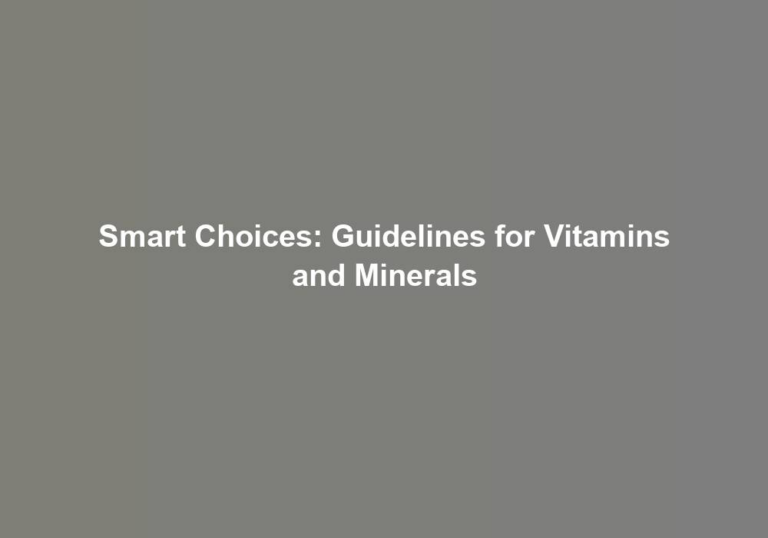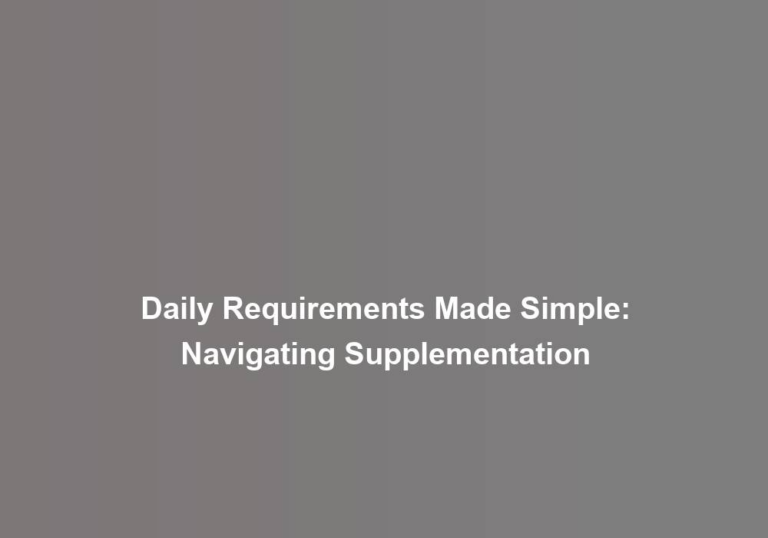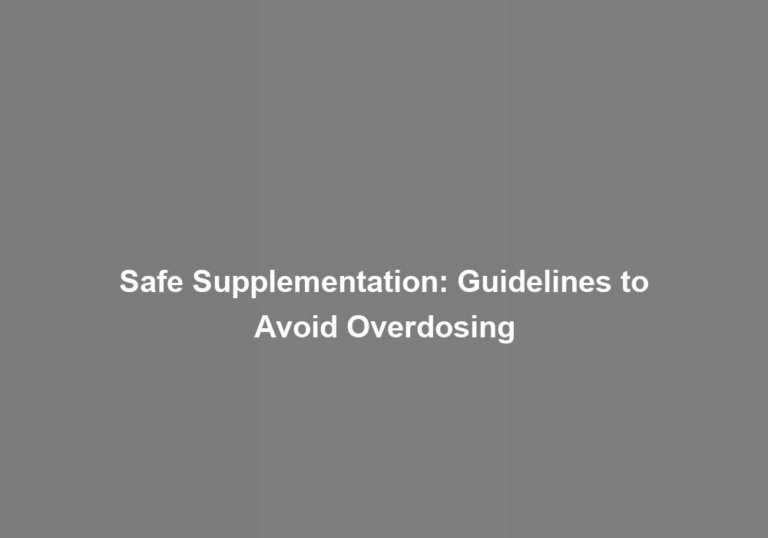Smart Supplementation: Guidelines for a Healthier You
You may not be aware that many of the nutrients your body needs for optimal function are not always obtained through diet alone. In fact, despite your best efforts to eat a well-balanced diet, certain factors such as soil depletion, food processing, and individual health conditions can make it challenging to get all the essential vitamins and minerals your body requires. But fear not, there are smart supplementation guidelines that can help you navigate the world of supplements to support your overall health and well-being. By understanding how to choose the right supplements, timing and dosage considerations, potential interactions and risks, and the importance of consulting with healthcare professionals, you can take control of your health in a proactive and informed manner.
Understanding Your BodyG??s Needs
Do you know what your body needs to function at its best? Understanding your bodyG??s nutritional needs is crucial for maintaining optimal health. Nutrient absorption is a key factor in ensuring that your body receives the essential vitamins it requires to function properly. Essential vitamins such as vitamin A, C, D, E, and K play vital roles in various bodily functions, including immune support, bone health, and energy production.
To support nutrient absorption, itG??s important to consume a diverse range of foods. Each vitamin and mineral has its own unique absorption process, and consuming a variety of nutrient-dense foods can help ensure that your body is effectively absorbing these essential nutrients. For example, vitamin D is best absorbed in the presence of fat, so consuming foods rich in healthy fats alongside vitamin D sources can enhance its absorption.
In some cases, supplementation may be necessary to address specific deficiencies or to support overall health. However, itG??s important to consult with a healthcare professional before starting any supplementation regimen, as excessive intake of certain vitamins can have adverse effects.
Understanding your bodyG??s needs for nutrient absorption and essential vitamins is the first step towards making informed decisions about your health. By prioritizing a balanced and varied diet, seeking professional guidance when considering supplementation, and staying informed about the latest research, you can ensure that your body receives the nutrients it needs to thrive.
Choosing the Right Supplements
When selecting supplements, it is important to consider your individual nutritional needs and consult with a healthcare professional to determine the most suitable options for your health goals. Achieving nutritional balance is crucial when choosing the right supplements. ItG??s essential to identify any deficiencies in your diet and select supplements that address those specific needs. For example, if you have a low intake of vitamin D due to limited sun exposure, choosing a quality vitamin D supplement can help maintain optimal levels in your body.
Quality assurance is another key factor in choosing the right supplements. Look for products that have been tested by a third-party organization, such as NSF International, USP, or ConsumerLab.com, to ensure that they meet quality and safety standards. These organizations test supplements for purity, potency, and overall quality, providing you with reassurance about the products you are consuming.
Additionally, consider the form of the supplement. Some nutrients are better absorbed in certain forms. For instance, when choosing a calcium supplement, calcium citrate is often better absorbed than calcium carbonate, especially for individuals with low stomach acid. Being mindful of the form of the supplement can enhance its effectiveness in supporting your nutritional needs.
Timing and Dosage Considerations
To optimize the effectiveness of your supplements, it is important to consider the timing and dosage of consumption. When it comes to timing, taking your supplements with or after meals can enhance their absorption. For instance, fat-soluble vitamins like A, D, E, and K are best absorbed when consumed with a meal containing fats. On the other hand, some supplements, such as iron and calcium, may be better absorbed when taken between meals. ItG??s also essential to consider the interactions between supplements and medications, as certain combinations can affect absorption and effectiveness.
In addition to timing, dosage is a crucial factor in maximizing the benefits of your supplements. ItG??s important to adhere to the recommended dosage provided on the product label or as advised by a healthcare professional. Taking more than the recommended dosage does not necessarily lead to better results and can even be harmful in some cases. Conversely, taking less than the recommended dosage may not provide the intended health benefits.
Furthermore, splitting your daily dosage into smaller, more frequent doses can help maintain optimal blood levels of certain nutrients. For instance, dividing your vitamin C intake throughout the day may result in better absorption and utilization by the body. Considering these timing and dosage factors can contribute to the maximum effectiveness of your supplementation regimen, ensuring that you derive the full benefits from your chosen supplements.
Potential Interactions and Risks
Before starting any new supplement, itG??s important to be aware of potential interactions and risks. Certain supplements may interact with medications, leading to adverse effects or reduced effectiveness. Additionally, some supplements may pose health risks or require safety precautions for certain individuals. Always consult with a healthcare professional before adding new supplements to your regimen to ensure they are safe and appropriate for your specific situation.
Drug Interactions
Understanding potential drug interactions and their associated risks is crucial for maintaining your health while taking supplements. ItG??s important to consider the potential interactions between supplements and medications to ensure medication safety. Some supplements can interfere with the absorption, metabolism, or excretion of medications, leading to reduced effectiveness or increased side effects. For instance, St.-?JohnG??s Wort can interact with antidepressants, birth control pills, and blood thinners. On the other hand, vitamin K can reduce the effectiveness of blood thinners. To avoid interactions, always inform your healthcare provider about any supplements you are taking, including vitamins, minerals, and herbal products. They can provide guidance on potential interactions and adjust your medication regimen accordingly. This proactive approach can help prevent adverse effects and ensure the effectiveness of your treatment.
Health Risks
Be mindful of potential interactions and risks associated with supplements to safeguard your health and well-being. Some supplements may have potential side effects or interact with medications, posing health risks if not taken with caution. ItG??s important to understand the potential long term consequences of supplements, especially at high doses or when taken for extended periods. HereG??s a quick reference guide to common supplement risks:
| Supplement | Potential Side Effects | Long Term Consequences |
|---|---|---|
| Vitamin D | Nausea, constipation | Kidney damage, hypercalcemia |
| Iron | Constipation, stomach pain | Organ damage, iron overload |
| Fish Oil | Fishy aftertaste, bad breath | Increased bleeding risk |
| Calcium | Constipation, kidney stones | Cardiovascular risks |
Always consult with a healthcare professional before starting any new supplements, especially if you have existing health conditions or are taking medications.
Safety Precautions
Mindful consideration of potential interactions and risks associated with supplements is crucial for safeguarding your health and well-being. Before starting any new supplement, itG??s essential to be aware of potential side effects and interactions with medications you may be taking. Always consult with a healthcare professional to ensure the supplements youG??re considering are safe for you, especially if you have any underlying health conditions. Additionally, proper storage of supplements is important to maintain their effectiveness and prevent any potential risks. Store supplements in a cool, dry place, away from direct sunlight, and out of reach of children. Be sure to follow the recommended dosage and not exceed it unless advised by a healthcare provider. Taking these safety precautions will help you maximize the benefits of supplementation while minimizing potential risks.
Monitoring and Adjusting Your Regimen
To effectively monitor and adjust your supplementation regimen, it is essential to keep detailed records of your daily intake and any changes in your health or well-being. Start by creating a schedule for taking your supplements and stick to it. This will help you track your progress and identify any patterns between the timing of your intake and how you feel. For instance, if you notice that taking a certain supplement in the morning makes you feel more energetic throughout the day, you may want to adjust your schedule to ensure consistent morning intake.
Tracking your progress is crucial in determining the effectiveness of your supplementation regimen. Keep a journal to record any changes in your health, mood, energy levels, or any new symptoms that may arise. This will help you and your healthcare provider identify any correlations between your supplementation and your well-being. If you notice any adverse effects or no improvement in your health, it may be time to adjust your regimen. Discuss any changes you want to make with your healthcare provider to ensure they align with your overall health plan.
Remember that monitoring and adjusting your supplementation regimen is an ongoing process. As your bodyG??s needs change, so might your supplementation needs. By staying attentive to your bodyG??s responses and making necessary adjustments, you can optimize the benefits of your supplementation regimen for a healthier you.
Consulting With Healthcare Professionals
Before making any changes to your supplementation regimen, itG??s crucial to consult with healthcare professionals. Their expert advice can provide you with valuable insights and ensure that you are making informed decisions about your health. Collaborating with your medical team can help you tailor your supplementation plan to meet your individual needs and address any potential concerns.
Expert Advice Importance
Seeking guidance from healthcare professionals is crucial for making informed decisions about dietary supplementation and overall health. When it comes to expert advice, a personalized approach is essential because everyoneG??s body is unique and may have different nutritional needs. Consulting with a healthcare professional can help you understand how specific supplements may interact with your individual health conditions, medications, or lifestyle. They can also provide tailored recommendations based on your medical history and current health status. This personalized guidance can prevent potential adverse effects and ensure that youG??re taking the right supplements in the right amounts. Additionally, healthcare professionals can offer valuable insights into alternative supplementation options that align with your health goals. By seeking expert advice, you empower yourself to make well-informed choices that support your overall well-being.
Medical Team Collaboration
When considering dietary supplementation, collaborating with your medical team is essential for personalized guidance that aligns with your unique health needs and goals. A team approach involving healthcare professionals ensures that you receive tailored advice based on your medical history, current medications, and specific health concerns. Collaborative care allows for a comprehensive assessment of potential interactions between supplements and any existing health conditions, medications, or ongoing treatments. Your medical team can also provide evidence-based recommendations, taking into account the latest research and clinical guidelines. Moreover, they can help monitor your progress and make adjustments as needed, optimizing the effectiveness and safety of your supplementation regimen. By working closely with your healthcare professionals, you can navigate the complex landscape of dietary supplements with confidence and peace of mind.
Conclusion
Now that you understand your bodyG??s needs and how to choose the right supplements, itG??s time to take action. Remember to consider timing and dosage, potential interactions and risks, and always monitor and adjust your regimen as needed. And donG??t forget to consult with healthcare professionals for personalized guidance. By following these guidelines, you can ensure a healthier you through smart supplementation.







